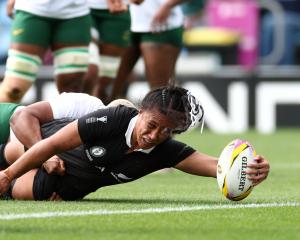
What happens after the games?
It is something every athlete has to consider eventually.
But even the best forward planning cannot always adequately prepare an individual for what can feel like a monumental shift in a person’s identity.
Massey University professor of sports psychology Gary Hermansson has a thorough understanding of the problems former athletes face when making the transition to a more regular life, if there is such a thing.
Among his many professional achievements, Hermansson has worked as a sports psychologist for the New Zealand team during five Olympic campaigns. Yet it is his personal insights which are perhaps his most valuable tool. A former provincial rugby player, Hermansson said it took "well over year" to adjust to life after sport.
"Even though I had an education behind me and chose to retire rather than being forced into it, it took a long time to come to grips with the fact that I was different," he said.
"There were moments when it was really, really tough and other moments where it was quite exciting as well.
"I don’t think there is ever a case where people just draw a line and say,‘right, that’s done’.
"The key challenge is it is a loss of identity. The way you see yourself, the way you experience yourself and the way you connect with the world around you changes. The hard part is to adapting to who you are now."
Every athlete, either through injury, retirement or non-selection, is eventually forced into change.
"That can place some pretty heavy demands on mentally because you lose all those things which go with that like the sense of being recognised, applauded, affirmed and being seen by people as a person who has some value."
As much as you can plan for life after sport, until it happens there is no way to tap into the sort of emotions you will suddenly be confronted with.
"Some people have a very strong sense of achievement and worth that goes beyond sport. They may make the transition quite easily.
"But those who might have some basic fundamental challenges around their self worth can suddenly be thrown into a bit of a vacuum and that’s hard."
New Zealand Rugby Players Association chief executive Rob Nichol believes the key to managing the transition is by refusing to be defined by the sport in which you participate.
"The starting point is to fight it and don’t let yourself be labelled as just a rugby player, a cricket player or a swimmer," Nichol said.
"Fight it and say, ‘No, no. That’s what I do it is not who I am’. Try to build your own individual identity.
"Boxing people in is the worst thing we can do for each other."
The NZRPA provides much practical help but is increasingly putting resources into helping its members cope with the emotional challenges as well.
That help is needed more than ever. In a survey of its members, about 80% of respondents indicated they had a rocky transition.
"About 80-something percent of players had a period of three months or more unemployed. Eighty-something percent of players earned less than $60,000 in the two years after their retirement.
"And there were a lot or revealing statistics around alcohol, relationships and behavioural challenges."
While sport offers some the opportunity for significant material gain, others will have made sacrifices, whether that is delaying education or forgoing other work opportunities. The thought of starting from the bottom can be daunting.
For some former athletes, physical injuries can make adjusting to post sporting life even more difficult.
It has been a badge of honour to soldier on when injured but that is shifting to a more sensible approach to health and wellbeing. There is a lot more awareness of the link between concussion and depression for example.
"Up until three or fours years ago concussion was very, very poorly managed within rugby," Nichol said.
"The initiatives which have happened in rugby ... are designed to be much more robust in that area, hence you are seeing a lot more players being more conservative in terms of their return to rugby."













